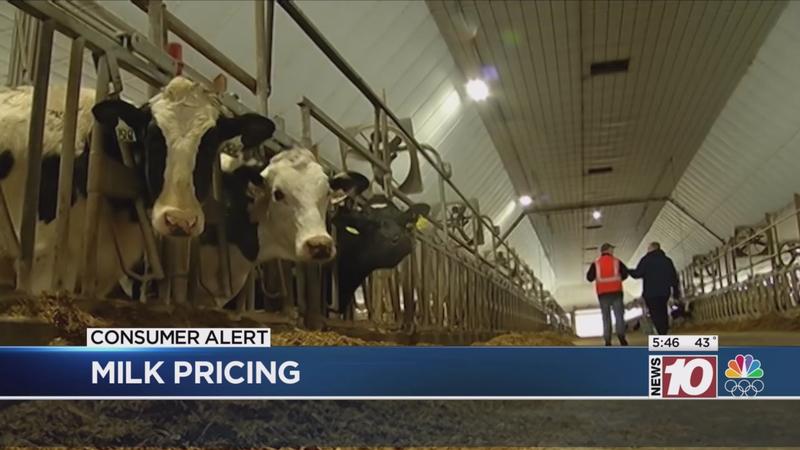Consumer Alert: Got Milk? How a proposed bill could affect milk prices
[anvplayer video=”5074813″ station=”998131″]
ROCHESTER, N.Y. (WHEC) — Got milk? In New York State, the answer is yes. Milk production in the Empire State has increased this year, but the price we’re paying at the grocery store has not.
The price of milk has only increased 1.4% year over year. Compare that to beef steaks that have increased about 25%. But unlike beef, milk prices are federally controlled, and the pricing process is so convoluted, it’s often said that only three people really understand it and two of them are lying.
I’m going to try to explain it very simply and why this matters to us as consumers. New York is the fourth largest dairy-producing state in the country and New York dairy producers are hurting, in part because inflation has hit them hard. The prices of feed and labor have skyrocketed, but what they get for milk has not. And the way prices are set is about the strangest thing I’ve ever researched.
For example, let’s say my co-anchor, Brett Davidsen and I are both dairy farmers. Our milk is the same. It’s high-quality New York milk, but I sell my milk to a processor who puts it in a carton for you to drink and Brett sells his milk to a cheese plant. In this country, how the milk is used determines the price and milk that’s processed to go in a carton is priced higher than milk used to make cheese. So even though Brett and I both produce quality milk, I would make more money because of how my milk will be used.
So the federal government mandates that the milk prices be pooled so producers all get paid the same price, no matter how the milk is utilized. But there are convoluted formulas that determine what farmers are actually paid, and those formulas have decimated dairy farmers in New York.

[News10NBC]
New York Senator Kirsten Gillibrand (D) proposed the Dairy Pricing Opportunity Act which would force the USDA to evaluate the formulas. So I asked the senator if formula changes that pay farmers more might also mean we have to pay more for milk at the grocery store.
"The formula is about what the farmers receive and will not impact what families have to pay to get a carton of milk,” Sen. Gillibrand said. “And one of the reasons why I think for New York families particularly the price of milk has been less affected is because most of the inflationary pressures we see in New York are supply chain-related and for most consumers in New York, they get their milk supply locally."
And that’s why the price that New York dairy farmers are paid matters to you, the consumer. If New York Dairy farmers go belly-up, we’d pay more if products had to be shipped across the country. I’ll follow the bill’s progress and report back to you.